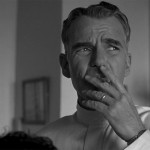Dir. by Joel and Ethan Coen
Images: Another beautifully shot film from Roger Deakins. They obviously enjoyed taking advantage of the opportunities afforded by shooting in B&W: Crane smokes constantly, lighting is often in stark contrast, all trademarks of noir. Favorite images: Crane sitting alone in exact middle of couch, Birdy backlit at the piano, and lawyer Riedenschneider bathed in light streaming in from prison window (a scene straight out of citizen Kane).
• • •
Joel and Ethan Coen have carved out an enviable niche for themselves. Working for nearly two decades now in relative independence from studio interference, they have written, directed, and produced a series of interesting, if not always successful (either commercially or artistically), films. In doing so, they have somehow managed to garner the affection of both the popular press and the Hollywood community, while simultaneously fostering a rabid, cult-like fan following: those who can quote Raising Arizona for any occasion and who laugh a bit too loud at theatrical showings. On more than one occasion I’ve heard the Coens described as the “saviors” of American film, a moniker that would, I’m sure, inspire quiet, ironic laughter from the men themselves.
In a word, the Coens have become critic-proof: to criticize one of their films is to resign oneself to a place among the “unhip.” Which brings me to The Man Who Wasn’t There, a film I’m hesitant to describe as a disappointment, if only because, by doing so, I’m setting myself up to the inevitable and tired rebuttals: “The jokes on you. The Coens love to break the rules. They set you up, and you fell for it.” Actually, I do get it. I’m just beginning to lose interest. Or, more precisely, the Coens are failing to hold my interest. But more on that later . . .
I’m also hesitant to label The Man a disappointment because so much of it is so good. Billy Bob Thornton is impressive in the title role, playing a barber named Ed Crane whose life is lived in futile routine — a mindless job, a loveless marriage. When he becomes embroiled in a messy murder, involving his wife (Frances McDormand), her lover (James Gandolfini), and a traveling businessman (Jon Polito), it appears that, with the excitement, he might also find some meaning in his life. But in typical noir fashion, the exact opposite occurs. In that sense, the conceit of the film is an interesting one: “Modern Man” (as his lawyer refers to him) fights back, becoming active for the first time in his life. But his action leads only to the destruction of everything he holds dear (if anyone is, in fact, capable of holding anything “dear” in a Coen film). Frank Norris would have loved it.
The problem with The Man is that, perhaps for the first time, the Coens have invested a character with genuine pathos, but seem to have done so (much to my own personal annoyance) only in the interest of later undercutting it with their typical brand of cynical Nihilism. As a pure character study of Ed Crane, the film flirts with honesty and sincerity, which gives certain scenes a quiet grace unlike anything seen in earlier Coen films. For instance, at a Christmas party, Ed discovers a teen-age girl playing Beethoven at the piano. It’s a beautiful scene. Ed is obviously drawn to both the girl — her potential and innocence — and to the music, which seems to offer him some glimpse of beauty.
But such things — truth, beauty, innocence — don’t exist in the Coen’s world, and any sad sap who believes that they do (like Ed Crane or me, for instance) is just being set up for ridicule. The relationship between Ed and the girl eventually becomes another Coen punchline: the two end up in a car accident after the “innocent” girl leans over to give Ed a blow job. I guess the joke worked. Several others in the theater laughed (a few too loudly).
The Coens seem to have stepped into an interesting trap here. Never before have any of their films tried so hard to be about something — and, honestly, by the time Tony Shaloub’s lawyer began his speech about “the more you look at something the less chance there is of it making sense” I was just shaking my head — but, ultimately, The Man Who Wasn’t There is only about meaninglessness: the meaninglessness of our lives, the meaninglessness of our loves, and the meaninglessness of this film. I might be willing to buy it all if the Coens hadn’t offered glimpses of something much greater. But, in the end, their cynicism and this film just feel hollow.
